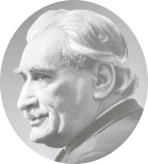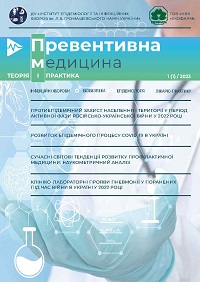








Journal
«Preventive Medicine. Theory and Practice»
«Preventive Medicine. Theory and Practice»






Editorial ethics. The review process.
The editorial board of the journal "Preventive Medicine. Theory and Practice" adheres to the ethical standards accepted by the international scientific community and does its best to prevent any violations of these standards. This declaration is in line with the journal's policy and is one of the main components of the journal's review and publication.In its efforts, the editorial board of the journal "Preventive Medicine. Theory and Practice" adheres to the recommendations and standards of the Committee on Publication Ethics (COPE), the Publishing Ethics Resource Kit, Elsevier, and also takes into consideration experience of authoritative international journals and publications.
The following principles are mandatory foundations and norms of professional behavior for all parties involved in the process of creating, reviewing, and publishing a scientific article: authors, reviewers, editors, publishers, and readers. Compliance with the rules of ethics of scientific publication by all participants in the process helps to ensure the rights of authors to intellectual property, improve the quality of the journal "Preventive Medicine. Theory and Practice" in the eyes of the national and world scientific community and the exclusion of the possibility of misuse of copyrighted materials in the interests of individuals.
1. Professional ethics in the practice of the editorial board and editorial staff
The editorial board of the journal "Preventive Medicine. Theory and Practice" is guided in its work by the principles of the Code of Conduct and Best Practice for Journal Editors, International Standards for Editors on a Responsible Approach to the Publication of Research Papers, and Guidelines for Editors on the Quality of Research.
1.1. The editorial board of the journal "Preventive Medicine. Theory and Practice" is responsible for all published materials, ensuring their high quality and reliability and recognizes this responsibility. The decision of the editors to accept or refuse to publish an article is based on the scientific and/or practical significance of the article, its originality, clarity of presentation, reliability of the materials contained in it, as well as compliance with the main subject of the journal.
1.2. The editorial board of the journal "Preventive Medicine. Theory and Practice" provides assistance to the author(s) in improving the submitted manuscripts through scientific review and editing articles, as well as assistance in establishing contacts with other journals and publications.
1.3. The editorial board of the journal "Preventive Medicine. Theory and Practice" ensures fair, impartial and timely review of articles, reviews and other materials proposed for publication by specialists who have the appropriate qualifications and who do not have any conflict of interest (personal, commercial, political, academic or financial) in connection with this work.
1.4. The editorial board of the journal "Preventive Medicine. Theory and Practice" is obliged to inform the author(s) of all comments on their work made by reviewers, unless they contain offensive or defamatory remarks.
1.5. The editorial board of the journal "Preventive Medicine. Theory and Practice" ensures the confidentiality of materials submitted to the journal during the review process. Confidential information received in the course of correspondence with the author(s) is also not subject to disclosure.
1.6. The Editorial Board may reject the material without an independent review if it is deemed to be of poor quality or does not fulfill the journal's profile. The decision not to send the material for an independent review is based only on its scientific content or compliance with the profile of the journal "Preventive Medicine. Theory and Practice" and does not depend on the author's personality (place of work, race, gender, sexual orientation, religious views, nationality, citizenship, origin, social status, political views, etc.)
1.7. Unpublished data should not be used by the editor-in-chief, editorial staff, members of the editorial board of the journal "Preventive Medicine. Theory and Practice" for personal purposes or transferred to third parties without the written consent of the author(s).
1.8. When considering the results of clinical trials, the editorial board of the journal "Preventive Medicine. Theory and Practice" should require a document approved by the Ethics Committee, which guarantees the compliance of the submitted materials with the provisions of the Helsinki Declaration of Ethics for Medical Research.
1.9. The editor-in-chief of the journal "Preventive Medicine. Theory and Practice" decides on the publication of the article based on expert evaluation by independent reviewers and the opinion of the members of the editorial board.
1.10. The editorial board of the journal "Preventive Medicine. Theory and Practice" may reject an article if it violates the intellectual property rights of third parties, the norms of scientific ethics or contains information of limited access. The editor-in-chief of the journal "Preventive Medicine. Theory and Practice" should refuse to consider the article if there is a conflict of interest (personal, commercial, political, academic, financial).
1.11. The Editor-in-Chief and members of the Editorial Board do not attempt to influence the rating of the journal "Preventive Medicine. Theory and Practice" by artificially increasing any indicators of the journal. For example, they have no right to require authors to cite the journal, add links to articles published in the journal. Any recommendations for citing papers should be based on their scientific significance and aim to improve the material presented.
1.12. Articles, reviews and other materials submitted for publication by the Editor-in-Chief, members of the Editorial Board and the Editorial Council of the journal "Preventive Medicine. Theory and Practice" are reviewed impartially, as well as materials of other authors.
2. Ethical principles that should guide the author(s) of a scientific publication
The author/collective of authors of a scientific publication should be guided by the provisions developed at the 2nd World Conference on Research Integrity regarding their reliability and thoroughness, honesty, balance, originality, transparency, attribution and citation, compliance with peer review and publication agreements, responsible reporting of research results involving humans or animals, etc.
2.1. The authors of an article are considered to be persons who have made a significant contribution to the formulation and solution of the problem considered in the article, the concept, planning, execution, interpretation of the research results, and who share responsibility for the results. It is unacceptable to list as co-authors persons who did not participate in the study. If any person participated in a substantial part of the study but is not included in the list of authors, then he or she should be acknowledged.
2.2. All authors must agree to be included in the list of authors and agree on the manuscript sent to the editorial board of the journal "Preventive Medicine. Theory and Practice" manuscript. Any changes in the list of authors must be agreed with all authors.
2.3. The results of the study should be presented honestly, without fabrication, falsification or manipulation of data.
2.4. The author(s) of the article must comply with the requirements for publications, are responsible for the originality and accuracy of the material presented. This material should not have been published earlier or simultaneously submitted for publication to other publications, unless the publishers agree to a co-publication (which should be communicated to the readers).
2.5. If the authors have used the work and/or text fragments of other authors, there should be appropriate references to the published works.
2.6 Different publications arising from the work on one research project should be clearly identified and contain references to the original publications.
2.7. A series of articles that publish the results of a comprehensive study should be organized in such a way that the reader can get a comprehensive picture of both the structure of the study as a whole and each of its aspects covered in the relevant article.
2.8. The author(s) should eliminate the comments on the article made by the editorial board and/or reviewers within the time limits set by the editorial board.
2.9. If the author finds a significant error or inaccuracy in his/her work, he/she should immediately notify the editorial board of the journal "Preventive Medicine. Theory and Practice" and make corrections to the manuscript as soon as possible.
2.10. If the analysis of the state of the problem is based on confidential information (personal communication, review of manuscripts, grants, etc.), this information cannot be published without the consent of the persons who are its sources.
2.11. Authors should provide a professional response to the reviewer's questions as soon as possible or notify the reviewer of their refusal to review or disagreement to respond to the reviewer's comments.
2.12. At the request of the editorial board of the journal "Preventive Medicine. Theory and Practice", the authors must provide documents to confirm that the research presented in the paper has received the necessary permits and was conducted in compliance with the requirements of the bioethics committee. The manuscript submitted for publication should not contain personal data of a person (patient) collected during the study or illustrative materials that allow identification of a person.
2.13. The author may inform the editorial board of the journal "Preventive Medicine. Theory and Practice" about conflicts of interest (administrative, research and financial) related to his work. The Editorial Board should take this information into account when organizing the review and making a decision on the publication of the relevant manuscript.
2.14. Publication under one's own name of another's manuscript (part of it), quoting or paraphrasing the content without reference to the source of borrowing, as well as other forms of misappropriation of the results of other people's research are considered as plagiarism. Plagiarism in any form contradicts the norms of scientific ethics and is unacceptable. Persons found guilty of plagiarism are deprived of the opportunity to publish in the journal. The editorial board of the journal may publish on its pages the cases of plagiarism that have become known to it.
2.15. In case of acceptance for publication, the article is placed in the public domain, and the authors retain the copyright.
3. Ethical principles that should guide reviewers
To enhance the quality of research and publications, editors should engage independent experts to evaluate the materials they receive. These experts should provide a written review, conducting an impartial scientific examination of the author's work and offering an objective and reasoned assessment of the research results presented. Reviewers should be guided by basic ethical principles.
3.1. Reviewers cannot be authors or co-authors of the manuscript, supervisors of degree candidates, or employees of the department in which the author(s) work.
3.2. Reviewers should only agree to review manuscripts for which they have the necessary qualifications and knowledge and which they can review within the allotted time.
3.3. In case of a conflict of interest, inconsistency of the research results with the reviewer's scientific competence, professional relationships with the authors that may affect the objectivity of the review, or inability to complete the work within the established deadlines, the reviewer must report it to the Editorial Board and decline to evaluate the manuscript.
3.4. The reviewer must ensure that the content of the review is not influenced by the origin of the manuscript, the nationality, religious affiliation, political views, or any other personal views of the authors, or commercial considerations.
3.5. The scientific examination of the author's materials should take into account the compliance of the work with scientific, ethical, and literary standards. It is important to adhere to these standards in order to maintain the integrity of the scientific process.
3.6. If the reviewer alleges that the information in the manuscript has been previously published, they must provide appropriate references to support their claim.
3.7. Personal criticism of the authors and the use of slanderous arguments that defame them are not acceptable in the review.
3.8. The reviewer must maintain confidentiality regarding the reviewed work and any unpublished materials. They must not disclose any details or use the materials for personal gain or to harm or discredit others.






